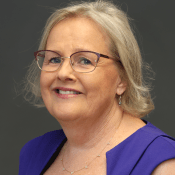
Would you like a career where you could help people while earning a sweet income with full benefits? How about the ability to find a job in your field no matter how your life changes or where you choose to move? Do you enjoy a flexible schedule, being part of a team, learning the latest technology? If so, then maybe a career in the health professions is right for you.
There are so many ways to learn the skills needed for the many health care jobs that are out there just waiting to be filled. I’d like to tell you about the health professions programs offered at Lincoln Land Community College (LLCC) as the dean of these programs and, more importantly, as an RN of over 40 years having completed my RN degree at LLCC.
Most people are familiar with nurses in health care — RNs, LPNs and certified nursing assistants (CNAs), and all of these programs are available at LLCC. These positions continue to be in high demand and play a vital role in our community’s care. As a nurse, I also recognize, and have great appreciation for, other health professionals who provide direct patient care where you have interactions directly supporting patients.
Some of the other direct patient care programs, in addition to nursing, include LLCC Fire Science, Emergency Medical Services, Occupational Therapy Assistant, Respiratory Care and Surgical Technology. I would like to share with you what I find interesting and exciting about each of these programs and encourage you to find out more from the program pros on the LLCC website!
The LLCC first responder programs include Fire Science and Emergency Medical Services (EMS). The Fire Science and EMS programs offer many certificates as well as a degree option. EMS is built with pathways for “upskilling” from EMT Basic (one semester) to Advanced EMT (24 weeks), to Paramedic (11 months). Hours for working as a first responder are truly flexible with the potential to work one-third of the year in a full-time position, and every day is different.
An occupational therapy assistant (OTA) is able to help people with disabilities, illness or injury. OTAs work in many different settings with individuals of every age. OTAs listen carefully to their patients to assist them in maintaining or achieving new goals and capabilities to let them live as independently as possible. The OTA program takes two years to complete.
Respiratory therapists (RTs) are integral members of the health care team. They provide emergency respiratory support for rapid response, code and trauma teams. RTs also collaborate with patients at the bedside and in clinics providing vital education about respiratory health.
Do you have an interest in all things surgery and operating room related? Check out the two-year Surgical Technology program. A certified surgical technologist (CST) is a key member of the team within the operating room. The CST works directly with the surgeon having been prepared in the realistic simulated surgical suite at LLCC and with extensive clinical opportunities. LLCC also has a one-semester program in Central Sterile Service Technician. Graduates work within central sterilizing in a clinical or hospital to manage, decontaminate, package, sterilize and distribute medical and surgical supplies.
LLCC also offers multiple diagnostic programs within health care. Physicians rely on laboratory and other diagnostic technologies to care for patients. The Neurodiagnostic Technology (NDT) program specializes in EEGs and other tests used to diagnose brain and other disorders of the nervous system. Radiography program graduates play a role in patient health by providing X-ray examinations. Students in the sonography programs, Diagnostic Medical Sonography and Cardiovascular Sonography, learn about ultrasound imaging. Sonography is the use of sound waves in diagnosing or monitoring conditions in pregnancy, abdominal, and cardiac disorders.
If you’re looking for a health care career that is non-clinical, that does not provide care to patients, look into medical coding. Medical coders work as part of the health care team to convert medical diagnoses, procedures and diagnostic tests into codes for reimbursement.
There is also the two-year Exercise and Sports Science degree that an LLCC graduate can take to transfer to fitness training, sports management or biomechanics degrees, or even move on to advanced degrees like physical therapy. Only your imagination limits you.
Whether you are interested in directly caring for people, performing diagnostic tests or working as part of the health care team as a medical coder, there is program for you in this field of health care — a field in which I take great pride and joy in working.
Whether you are looking to start, change or advance in your career, I encourage you to explore the in-demand and rewarding possibilities in health care. Learn more at www.llcc.edu/health-professions. Registration for spring classes at LLCC opens Oct. 17.
